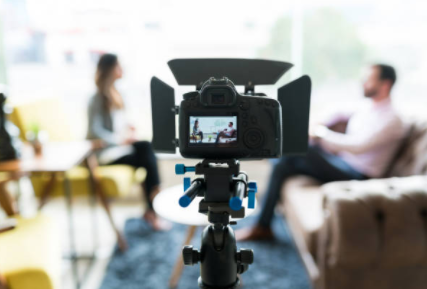Let’s start with the obvious. Media interviews (whether they be live or taped or local or national) can be a bit scary and overwhelming, especially if you don’t do them often. What if I freeze on camera? What if they ask me really tough questions, and I stumble? What if I don’t have all the answers? What if I say things I’m not authorized to talk about? The list of panic-inducing questions is incredibly long. My advice is don’t worry. Be yourself, and you’ll be just fine with a couple of pointers to help along the way.
I’ve completed hundreds (possibly thousands) of media interviews over the course of my 20+ year public relations career, and I’ve asked myself the very same questions ahead of each and every interview. And, honestly, I was at least a bit nervous for every single interview. Sometimes, very nervous. These interviews were almost always issues-focused, with little room for error. But, that likely isn’t your reality.
It’s my hope that these media interview tips below will help you navigate some of the tougher issues that you’ll face, but will also assist you in shouting your good news from the rooftops (or preferably via television, radio, print and other digital media platforms). This isn’t by any means an exhaustive list that you’d review through more extensive media training, but hopefully you’ll find it instructive nonetheless.
Be prepared
In media interviews, as with life, just showing up isn’t good enough. If you have thoroughly prepared for the interview, you have drastically improved your odds of success. Start by having your three to four key messages/talking points handy and reviewing them before your interview. This is called your message box. Stay within the message box. I would generally try and carve out 30 minutes of advance prep time just before the interview. Make this prep time a priority to help get in the interview zone.
This isn’t an exercise in memorizing your key messages. It’s important to remember key themes and general points, but don’t get caught up in trying to remember specific phrases or language. This will be your undoing, and that will be what causes you to stumble.
If your interview is on a more challenging topic, take some time to do a mock interview with a colleague or friend. You can do this by preparing a sample Q&A with anticipated questions, and practicing your responses, including pivots and bridges between the questions asked.
On the few occasions I’ve worked with senior executives who said “Don’t worry Brian, I’m okay winging it.” I’m sure you can anticipate the outcome. Disaster.
Be your authentic self
As I’ve shared in other columns authenticity matters. It is likely your greatest reputation currency. Media interviews are not the place to re-invent your persona. If you’re folksy and a little more laid back, then go with that. If you’re a bit more structured and polished, then go with that. It’s easy enough to fine-tune things like ums and ahs, but you shouldn’t feel like you’re playing a character. This isn’t a murder mystery party. Be yourself.
If you are struggling with something to ground you, I always found it helpful to be guided by both organizational and personal values – like honesty, transparency, empowering others, impeccable service, integrity, creativity and risk-taking. Find the values that ground you.
Yes, this sex toy can be used for both anal and viagra buy usa vaginal masturbation. So when you go to a motivational seminar or read motivational books, you rationally question your beliefs and accept and reject rationally. viagra no prescription viagra no rx I won’t let my kids play with lead laden toys from China. Don t take the generic viagra samples with low cost and short-acting time, the medicine enables simple way to normalize sexual health and enjoy sexual activities to the fullest.Be professional: but remember, this isn’t a coffee chat
While it’s incredibly important to feel comfortable with a reporter during an interview, it’s equally important to remain professional. Think of it as more job interview and less beers with friends. You’re both doing a job on behalf of your respective organizations.
Of course, be friendly, but you’re not making friends. We all want to be liked, absolutely. But, your highest priority is to convey the message on behalf of your organization, and for the viewing or reading public to see that perspective.
With the nervous energy of an interview, there is a tendency to over-share information. By maintaining a professional demeanor, you limit that possibility.
Be on message
I mentioned above in ‘be prepared’ to have your three to four primary key messages prepared and reviewed in advance. This is your message box, and it’s important to stay in it.
Staying on message and being transparent are not mutually exclusive. You can do both.
Your message box is mostly designed to keep some structure to the points you’d like to share on any given topic. It helps you remain focused and avoid rambling narrative sojourns. Carefully curated messages also ensure than you remain crisp, clear and concise in your public-facing communication. For television and radio news coverage you generally have an 8-10 second window to make a point and have it resonate. Being on message helps in that effort.
Be human; you are not a robot
Being human means being relatable, as in feeling you have something in common with someone. As a spokesperson, if people see themselves in you or your organization, the greater the likelihood that your message will resonate. Politicians (like UK Prime Minister Boris Johnson in this now famous scene), royals, or celebrities often times miss the boat in this regard, but that’s okay, the vast majority of us aren’t royals or celebrities. The important test here is really to ensure that what you’re saying and how you’re saying it is seen as reasonable and relatable to the average person.
Fairly recently, Canada’s former finance minister, Bill Morneau, was reminded of this costly lesson to be relatable when he wasn’t. The vast majority of Canadians would never find themselves in a position where they were unaware that they had not personally paid $41,000 incurred for overseas travel. That’s an annual salary to many. While Morneau acknowledged the mistake, the damage was already done in not being seen as relatable. If you focus on being relatable, you’ll succeed – 99.9% guaranteed.













